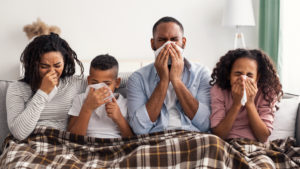
(WebMD) In about 40% of U.S. households during the holiday season, at least one person got sick with one of the trifecta of respiratory illnesses referred to as the tripledemic, a new survey shows.
The three viruses — the flu, COVID-19, and respiratory syncytial virus (RSV) — surged during the holidays, propelling hospitalization rates for the flu and RSV to record levels. According to the survey results from the Kaiser Family Foundation, 27% of households reported someone sick with the flu. COVID-19 infections affected 15% of households, and 10% reported an RSV infection.
Most people (75%) reported trying to get over-the-counter medicine to treat their illness. Among them, 1 in 5 said they had trouble finding those medicines amid shortages, and parents were more likely to report trouble finding over-the-counter medicines than non-parents.
Most people sick with the flu or COVID-19 did not try to get prescription medicines that can make the illness less severe. Among people sick with the flu, 16% sought the medication Tamiflu, while 14% of people sick with COVID-19 sought the medication Paxlovid.
The “tripledemic” viruses have all been on the retreat recently. RSV cases are down from over 20,000 weekly in November to less than 1,000 per week. Flu cases also continue to decline, but the total hospitalization case count for the entire flu season is still on track to be one of the highest in recent years. COVID-19 cases are also down.
The onslaught of the three viruses grabbed headlines and prompted health officials to ask the public to take precautions like getting flu and COVID vaccines. While the uptake of flu shots this season is average for kids (51%) and slightly up among adults (46%), COVID vaccine uptake has been underwhelming, at just 16% for the latest booster.
But people were willing to take other precautions amid the tripledemic, the survey results show. Nearly half of people surveyed said they took at least one protective measure, such as wearing a mask in public, avoiding large gatherings, traveling less, or avoiding dining indoors at restaurants. Wearing a mask was the most common precaution, at 31%.
People of different races reported taking precautions at differing rates. Two-thirds (67%) of Black and Hispanic adults said they took at least one precaution, while only 38% of white adults said they changed their behavior.
The survey included responses from 1,234 U.S. adults reached by phone or online in English or Spanish from Jan. 17 to Jan. 24, 2023.
